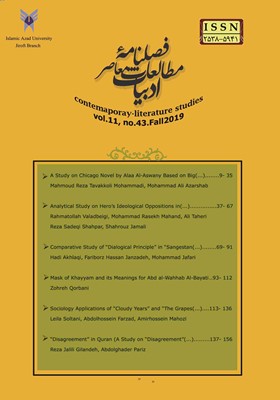Comparative Study of “Dialogical Principle” in “Sangestan Village” Ode by Akhavan and “Poverty & Sickness” Ode by Marouf Al Rusafi
Subject Areas : Contemporary Literature Studies
Hadi Akhlaqi
1
,
Fariborz Hassan Janzadeh
2
,
Mohammad Jafari
3
![]()
1 - PhD Candidate, Arabic Language & Literature, Islamic Azad University, Kashmar Branch
2 - Assistant Professor, Arabic Language & Literature, Islamic Azad University, Kashmar Branch
3 - Assistant Professor, Arabic Language & Literature, Islamic Azad University, Kashmar Branch
Keywords: معروف الرصافی, Bakhtin, باختین, الحواریة, أخوان ثالث, التعابیر الخطابیة, dialogical principle, Akhavān-Sāles, Marouf Al Rusafi, vocative phrases,
Abstract :
Poetry turns to be an art in the contemporary era in order to interact with others and society. Contemporary poets are not inconsiderate to their countries and attempt to react for them, propose strategy and talk to society’s elements. Thus many contemporary poets unlike old poets possess dialogical principle and its elements such as reciprocal conversation, vocative phrases, carnival, multilingual and chronotope notably. Mahdi Akhavān-Sāles – Iranian contemporary poet – and Marouf Al Rusafi – Iraqi contemporary poet – are the ones whose poetries are full of social concepts and fought against colonization and exploitation and tried to solve social problems with a dialogical field and conversational process. Therefore the present research attempts to survey dialogical principle by Mikhail Bakhtin in “Sangestan Village” Ode by Akhavān-Sāles and “Poverty & Sickness” Ode by Marouf Al Rusafi comparatively. The results show that the abovementioned odes were created because of social conditions and two poets tried to transfer their experiences by enjoying dialogical principle and using its indicatives in order to have effective and symbolic discourse. Both poets’ emphasis was on dialogical principle by applying vocative, interrogative, exclamatory, imperative, chronotope and carnival phrases. The applied method in the research is descriptive – analytical based on American school of comparative literature.
احمدی، بابک. 1378ش، متن و تأویل، تهران: مرکز.
اخوان ثالث، مهدی. 1389ش، منتخب اشعار(از این اوستا)، تهران: مروارید.
أنوشه، حسن. 1381ش، فرهنگنامه ادب فارسی، تهران: وزارت فرهنگ و ارشاد اسلامی.
بوبر، مارتین. 1380ش، من و تو، ترجمه ابوتراب سهراب و الهام عطاردی، تهران: فرزان روز.
تودوروف، تزوتان. 1377ش، منطق گفتوگویی میخائیل باختین، ترجمه داریوش کریمی، تهران: نشر مرکز.
الرصافی، معروف. 2014م، دیوان اشعار، مصر: مؤسسه هنداوی.
ریمون کنان، شلومیت. 1387ش، روایت شناسی بوطیقای معاصر، ترجمه ابوالفضل حری، تهران: نشر نیلوفر.
شمیسا، سیروس. 1378ش، نقد ادبی، الطبعة الأولی، تهران: انتشارات فردوس.
شمیسا، سیروس. 1388ش، نقد ادبی، الطبعة الثانیة، تهران: انتشارات فردوس.
غلامحسینزاده، غریبرضا و نگار غلامپور. 1387ش، میخائیل باختین، تهران: روزگار.
میر صادقی، جمال. 1376ش، عناصر داستان، ایران، الطبعة الثالثة، تهران: انتشارات سخن.
المقالات
پور نامداریان، تقی. 1385ش، «گفتوگو و غزل عرفانی»، پژوهشهای عرفانی، شماره 3، صص30-15.
پژوهنده، لیلا. 1384ش، «الفلسفة وظروف الحوار من نظرة مولوی وباختین وبوبر(دراسة مقارنة)»، المقالات والدراسات، رقم 77 (2)، صص11- 34.
مقدادی، بهرام و فرزاد بوبانی. 1382ش، «جویس وقضیة الحواری، دراسة باختینیة فی أعمال جیمز جویس»، دراسات اللغة الأجنبیة، الرقم 15، صص19-29.
نامورمطلق، بهمن. 1387ش، «باختین، گفتوگومندی و چندصدایی: مطالعه پیشابینامتنیت باختینی»، پژوهشنامه علوم انسانی، شماره 57، صص 398- 414.
_||_
